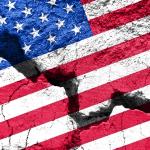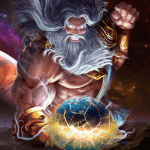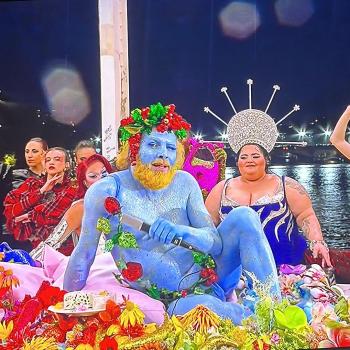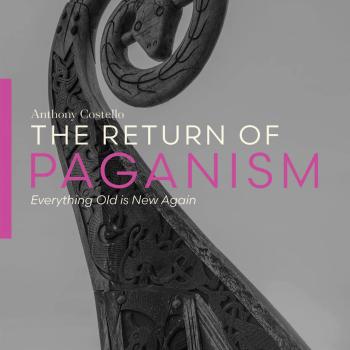I never acted out much when I was a kid. I never smoked, drank, or went all the way. My dad raised me to believe in God and Jesus, though my mother was largely unconcerned with religion. I never really questioned God’s existence but for a brief stint in high school, when I asked questions in class like how Christ’s crucifixion could save anyone, along with other questions anyone with a rudimentary understanding of Christianity could’ve addressed. Even then, my disbelief was halfhearted. Whatever doubt I’ve experienced hasn’t concerned God’s existence but His goodness. My dad instilled in me a god who didn’t have room for mercy or love. There were people who were Christians and people who were enemies. There were good people who suffered a lot and bad people who never went through anything. God, to me, was the belt Dad left hanging on my bedroom door each night to remind me not to get out of bed. But no matter what, it was me and Dad against the world, and the world to him included Christians as well.
Just like my dad didn’t give me a full picture of God, neither is this a full picture of my dad. During my childhood, my mother was mostly uninterested in me and left me to myself. I was an only child and had no neighborhood friends for most of my upbringing. So after his sixteen-hour shift in the ER as the only physician on hand, my dad would come home and play with me. He would make up stories for me where I was the hero defeating bullies and robots and dragons. We eventually started writing stories together where I would dictate the story and he would draw them. He was a good sketch artist. For all my dad’s faults, he tried when my mother wouldn’t, or couldn’t.
I soon began drawing and writing stories by myself. They all followed the hero-villain formula, and I looked to my characters, based off toys I had, for friendship. My stories became a way of escape for me and creating a world I understood.
—
I found out what sex was by finding lesbian porn under my mother’s bed. She brought her girlfriends home and slept with them in front of me. They watched porn in front of me too. During this time, I was repeatedly molested by a family member. I don’t remember all of it. I’ve chosen to forget most of it.
My mother threatened many times to leave me and go live somewhere else or send me to live with my dad. She would call him and yell at him about how much she couldn’t stand me and how she couldn’t get me to obey. I don’t know what I did to make her hate me so much.
After years of infidelity and being banished from his own house, I moved in with my dad and he filed for divorce. Dad said he wanted me to have a mother, so he tried to preserve the family as long as he could. My mother maintains that she loves me to this day and that my dad and I destroyed our family.
I recently recalled a memory I had forgotten. I was between three and five. I was in an above-ground pool, swimming with a young family friend. I slipped from the inflatable I was using and sank to the bottom. I didn’t know how to swim. I don’t know if I knew I was drowning, but I looked up at the surface and saw my mother looking down at me. She didn’t jump in or move. We just looked at each other, me up at her and her down at me.
Before long, my family friend pulled me to the surface, and my mother doted on me. But the look we shared said enough for me. I never had a mother. I was never born.
First Fire
Years passed. I went from a life of opulence with my mother to poverty with my dad: from a backyard pool and slide and suburbs and a private Christian academy to cow pies and bull nettle and a mobile home and Dibble Middle School. My dad regularly decried money. When he finally got any, he’d throw it at some ill-fated farm project: a greenhouse, a vineyard, a pig farm. He refused to work with hospitals or other doctors on ethical grounds, so he pulled in less than thirty thousand a year as a solo practitioner with his new wife as the volunteer office manager. They’ve often called it a ministry.
There was a boy in my grade at Dibble who used to find out which girls I liked so he could try to sleep with them. He would watch me from the school steps while he had his hands wrapped around their waists. When girls would sit with me on the bus, he’d flirt with them and touch them. One day he and his brother showed up at Dad’s place while I was gone, asking if he’d seen their dog. The boy’s brother was holding a machete. Dad leveled a rifle at them and told them, “If I see your dog, I’ll kill it and bring it to you.” He held the gun on them as they passed out the front gate.
I transferred to a different school in the area for high school. About halfway through my freshman year, our trailer burned down. They called it an electrical fire. But none of the breakers had been tripped, and none of the connections to the fan or the other appliances were frayed or especially blackened. Dad called it arson. I did too.
The May 20th, 2013, Moore, Oklahoma Tornado
I graduated high school and started looking into college. One day Dad said he was having trouble “choosing words.” I encouraged him to seek medical advice from colleagues.
About a week later, he called me, slurring his words. “I’m goin’ to the hospital. Isn’t that what you wanted?” His new wife drove him to the hospital and I followed. When I got there he’d stabilized, but he’d had a severe stroke. When I walked in, half his face hung down like hounds’ jowls. His wife went to get something and I asked him, “So what do we do now?” He said, “Pray,” and I wondered what he ever meant by that. God never runs for us. God doesn’t spare.
—
They eventually moved him to the rehab center. The stroke had damaged the part of his brain that regulates emotions. I walked in one day and he went from a smile and greeting immediately into weeping over a patient who had come to see him, sobbing, “I didn’t want him to see me like this.” It was the first time I ever put an arm around his shoulders. I could barely hold the weight.
I managed the farm while he was in rehab and came to visit him every day. It was about an hour drive. I got up one day about a week after he was admitted to go see him and noticed the sky was heavily overcast. There was something about the daylight, something menacing, preterit, watching me as I drove down the dirt trail and on the county road.
I stopped at a gas station before leaving town and listened to the radio. There were reports of potential tornadic activity in Newcastle, a town on the way to the rehab center. It was about halfway along the route. I thought about it for a while and decided it would be fine, that the reports were probably exaggerated. I could beat it if I hurried.
So I struck out. The sky was jaundiced over Newcastle. I saw the funnel cloud slowly touching down like some giant appendage from the clouds. I sped up and made it past Newcastle before it touched down. The sky turned overcast again as I crossed into Moore. Then baseball-sized hail began pelting my windshield, cracking the glass. During the downpour, I called a guy from my old Christian academy who lived in Moore and asked him if I could hunker down there. He agreed. As soon as I hung up the hail stopped. It was so quiet I couldn’t hear wind outside the car. It was like moving through a vacuum, through space.
—
I tried to find an entrance to his addition along 149th. It was blocked off on all sides by road construction. I found myself on 133rd when my friend from Moore called. “Where are you?” he asked. “I’m in Moore.” “No, where are you?” “I’m on 133rd.” “You need to get somewhere now.”
Then I saw it ahead as I rounded the corner. The tornado was probably about a thousand feet wide by then. It was just picking up momentum as it crossed from Newcastle. It would grow to over a mile wide by the end of it. “Oh shit,” I said. “There’s a tornado in front of me. Oh shit.” “I know,” he said. “You need to get somewhere safe.” “Oh shit. Oh shit.”
He hung up and I sped into the entrance to some neighborhood I didn’t know. I was going to try to cut through the addition and beat it to the other side. I started wondering if I would have to drive through someone’s house to make it out. But as I turned into the addition and sped down the first street, a man in gym shorts and a T-shirt flagged me down from his driveway. I sped to him and parked. “There’s a tornado behind you,” he said. “I know,” I said. It struck me how much louder it was outside the car. But even then it was strangely quiet, like it was pulling all the sound from the world.
We went into his closet and put a mattress between us and the door. We knelt there with our bodies pressed against it to keep it up. He started sobbing and reached for my hand and said, “My name is Glenn.” I told him mine. I shook his hand and he grabbed mine with both of his.
Moments passed. I asked him if I could pray for him. He said yes as he wept. It was a prayer I couldn’t close my eyes for. The only thing I found to say was, “God, it’s in Your hands.” As I looked for something else to say he prayed a sinner’s prayer and begged for his life. And we waited.
—
It went over us. It had to have left the ground to pass over us. Even my car was untouched. We were directly in its path. Then it was gone. I didn’t even hear it pass.
I left in the rain. I continued trying to find a way into my friend’s addition. I found myself in a trailer park. Branches, pinecones, and evergreen needles were strewn through the streets. I found a dog that was in shock, soaked through, covered in mud. It was wailing. A man got out of his car in front of me and tried to coax it into his car. When he touched it, it recoiled and bit at the air. I don’t think it even knew he was there. He yelled something at it; I couldn’t make it out. People were watching from their porches. He got back in his car and drove off. I wanted to do something but I passed by it. It cried.
The tornado sirens sounded again. The wail and siren and wind. I kept moving.
—
I got back to 149th. The stoplights were out. Police navigated people past down power lines. The front halves of a CVS and a Walgreens were blown off. Homes stood agape like failed suicides, waterlines geysering. A police car blared past, escorting a group in a Toyota Tacoma. They rode in the bed, elevating a man’s leg. There was a tourniquet around his thigh. I think his femoral artery had been severed. They held an IV bag above him. I remember his face. He was blank, past the point of pain, past stoicism or fear. Farther along than me.
I parked at a 7-Eleven. The awning over the gas pumps had been torn off. I locked the car and took off on foot. I turned the corner at the intersection among a mass of people. I found myself walking faster. I saw a white F-150 embedded in the ground, thrown like a toy, sixty-foot ruts trailing it. I saw a girl walking the other way. She smiled at me, not in some romantic or even friendly way, but in a comforting way, as if reminding me I was OK. I found myself running.
—
I found my friend’s place. I never found a way in except by foot. His family was surprised to see me, but they fed me a good steak on the gas grill out back. The power was out for most of Moore. We ate in the dark together.
My friend and his dad talked and asked me to go home. I wanted to stay. I didn’t know how to get home. “You’ll be fine,” they said. “You’re a big boy.” They gave me some directions onto I-35 and sent me on.
My heels bled in my boots as I walked back to my car on 149th. I remember seeing the rubble of houses as dusk set. Firefighters rummaged through looking for survivors. In the dark they looked like grave robbers.
I got in my car and left. I took city streets to Norman, the next town over, and I did make it home, and it was surreal to see the place intact, quiet and undisturbed, as if it had never seen loss.
—
I slept hard that night and woke to pelting rain the next morning. For a few moments I thought I had been brought back home just to die there, but it was just a rainstorm, and it passed.
I told my parents I was in Moore during the tornado. My dad said he’d kick my ass when he got home; my mother threw a fit, but it felt like feigned anger. I sat down and watched the news. The initial death toll was somewhere in the thirties or forties, if I recall right. The final was twenty-four. Of the twenty-four, seven were children at Plaza Towers Elementary School. They had drowned beneath a fallen wall. Their names were Addyson, Kyle, JaNae, Brandie, Sydney, Antonia, Nicholas, and Christopher. I didn’t know any of them. I didn’t know any of their parents. I sat in my recliner and felt I’d drowned them myself.
—
I’ve dealt with survivor’s guilt since, but it was especially intense the first few months after Moore. I told as few people as possible I’d survived. I imagined family members, parents, and friends of those who’d died finding out I’d lived through it, how my unscathed face would be a slap in theirs. I imagined them hitting me, invoking God to take me and give their children back, telling me I didn’t deserve to live, that I’d already had prom, that I’d already kissed someone, that I’d made my mistakes, and that they never would. I imagined having no response but, “You’re right.” I volunteered at Plaza Towers next week to help move rubble. I stood on top of it wondering who might lie beneath me.
I never had some moment where I officially decided to rededicate myself to God. I just remember I decided I’d make my life worth something in honor of those killed, and in honor of God for saving my life, though I was ashamed of it. I don’t know if I’ve lived up to that, and I probably wouldn’t believe you if you told me I have.
Second Fire
The next year was the worst of my life. In July, my home was burned down again. The state fire marshal walked out of the remains of our home carrying our pump rifle, handing it to Dad and saying, “You’re gonna need this.” It was ruled an arson this time.
The fire was so hot it burned through my bed frame. I noticed a small spire coming out of the ground when I was clearing the debris and gathering the metal. It was the iron cross I’d hung on my wall. It was all that made it out. Somewhere that kid and his brother danced, firelight off their sweat and naked bodies, marks in their machetes.
—
I met someone at my day job that year I thought I would marry. She left me standing in the parking lot of a YMCA with no reason for leaving but that I just wasn’t for her. I left my job and got another as a kennel technician, which is a diplomatic way of saying I was paid to pick up dog shit. I remember standing in the kennel as the dogs howled at each other. I screamed in the center, and they fell silent for half a minute before starting up again. I spent my Christmas working full-time, walking the dogs in the sleet and snow. I would get in my car and scream as I drove, and I would scream as I walked through the door of my college house. There was no peace, no voice that said, “I’ll never give you more than you can take.” It was more than I could take. There was no reprieve. I dreamt of her every night for five years.
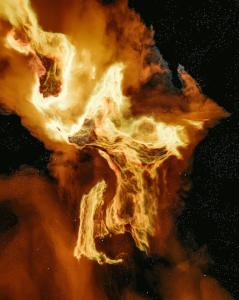
Encountering Jesus
The one ray of light during that period was my writing. I majored in creative writing during my undergrad, and the quality of my work received some praise in the program. My fiction became more mature and experimental. During this time, I also found I had an inclination toward poetry, something which was previously anathema to me. I never understood it before; I hated vagueness and abstraction. But when I understood despair, then I understood poetry, and it quickly became my main mode of creative expression. It was a way to process my emotions without the burden of narrative. I had a supportive group in my poetry classes that encouraged me to keep writing, and I did. It’s since resulted in twenty-six publications, the majority of which I secured during grad school, and the majority of which are poetry.
After graduating from college, I spent a number of months trying to figure out next steps and eventually developed an interest in Christian apologetics. Some of my motives were good: I felt more well-rounded as I developed my scientific and philosophical knowledge. Others weren’t; I used apologetics as a way of intellectually shaming people. Regardless, my love of apologetics led me to Biola University out in California, where I initially pursued an MA in Apologetics before transferring to their philosophy master’s. It was there that I saw how the Church was really supposed to function: unafraid to rejoice or mourn, always alongside you, living life truly together. It was also where I met my best friend, where I underwent therapy to address past traumas, where I started repairing the relationship with my mother, where my writing career began in earnest, and where I started my Christian literary project, Solum Literary Press, with the help of friends I met there.
But most importantly, I really met Christ there. Though I believed in God prior to Biola, I didn’t have a Christian worldview. There was nowhere Christ fit in my outlook on life. I put no stock in mercy or grace, and I had no idea what spiritual formation was. To be perfectly candid, I didn’t go to seminary because I wanted to learn more about God; I went because I thought that if I became a pastor, I could make a decent living, and maybe it would help my writing career. But through spiritual disciplines, therapy, and the witness of my best friend, I began to cultivate an understanding of Christ, His nature, and His love. I began praying to Jesus and the Holy Spirit instead of the Father alone, and I do feel Jesus when I pray to Him. It’s odd that I went to seminary to meet Christ instead of preach Christ.
This sounds saccharine, and it probably is. This isn’t to say that since meeting Christ, everything has worked out for me. I struggled with severe clinical depression, social anxiety, and PTSD throughout my time in grad school, and I still struggle with it. I have recurring nightmares where the boys who burned my house down are coming for me as their fire burns outside my window. I never married and still struggle with loneliness. But the difference now is that I have real community, real support, and a real relationship with Christ (a nascent one, but a relationship nonetheless).
I’m not sure why I’ve written this. I don’t know who, if anyone, needs to read my testimony. I don’t feel positioned to impart any life advice. But I can say that with Christ, life got better for me. Christ was with me and comforted me when I let Him be with me, and that did require a lot of work and change in thinking on my part. It required therapy and allowing people to help me. And depending on when you ask me, I might not feel Christ with me. But the difference now is though I don’t always feel Him, I know He’s there. Because He’s there, I know there’s love. To quote Mike Bonikowsky, a poet I’ve published under Solum, “It gets better, and it gets worse, but it’s always changing.” Christ is in the change.
For now we see through a glass, darkly; then face to face: now I know in part; but then shall I know even as also I am known.
1 Corinthians 13:12, KJV
Note: This article was originally published as “Testimony.” in Heart of Flesh.


